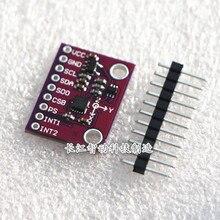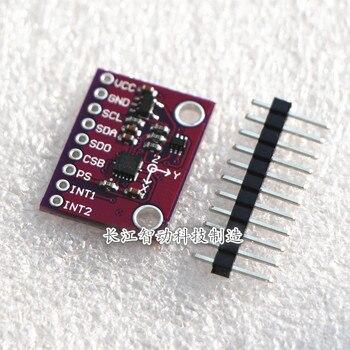The BMG160 is an ultra-small, digital 3-axis angular rate sensor with a measurement range up to 2000°/s and a digital resolution of 16 bit for consumer electronics applications.
The BMG160 allows low-noise measurement of angular rates in 3 perpendicular axes and is designed for use in cellular phones, handhelds, computer peripherals, man-machine interfaces, virtual reality features, remote and game controllers.
With its small footprint of only 3 x 3 mm² the BMG160 is unique in the class of low-noise consumer electronics gyroscopes. The zero-rate offset and offset stability over temperature of the BMG160 are outstanding.
| Parameter | Technical data |
|---|---|
| Digital resolution | 16 bit |
| Measurement ranges (programmable) |
± 125 °/s, ± 250 °/s, ± 500 °/s, ± 1000 °/s, ± 2000 °/s |
| Sensitivity (calibrated) | ± 125°/s: 262.4 LSB/°/s ± 250°/s: 131.2 LSB/°/s ± 500°/s: 65.5 LSB/°/s ± 1000°/s: 32.8 LSB/°/s ± 2000°/s: 16.4 LSB/°/s |
| Zero-g offset (typ., over life-time) | ± 1 °/s |
| Zero-rate offset over temperature | 0.015 °/s/K |
| Noise density (typ.) | 0.014 °/s/√Hz |
| Low-pass filter bandwiths (progr.) | 230, 116, 64, 47, 32, 23, 12 Hz |
| Date rates (programmable) | 2000, 1000, 400, 200, 100 Hz |
| Digital inputs/outputs | SPI, I²C, 2x digital interrupts |
| Supply voltage (VDD) | 2.4 … 3.6 V |
| I/0 supply voltage (VDDIO) | 1.2 … 3.6 V |
| Temperature range | -40 … +85 °C |
| Current consumption – full operation – low-power mode |
5.0 mA 2.5 mA |
| FIFO data buffer | 100 samples depth (each axis) |
| LGA package | 3 x 3 x 0.95 mm³ |
| Shock resistance | 10,000 g x 200 μs |
Parts Required
Connection
| Beaglebone | Module |
| 3.3v – P9.3 | Vcc |
| Gnd – P9.1 | Gnd |
| SDA – P9.20 | SDA |
| SCL – P9.19 | SCL |
Code
This is a python example, I used the cloud9 IDE
[codesyntax lang=”python”]
# Distributed with a free-will license.
# Use it any way you want, profit or free, provided it fits in the licenses of its associated works.
# BMG160
# This code is designed to work with the BMG160_I2CS I2C Mini Module available from ControlEverything.com.
# https://www.controleverything.com/content/Gyro?sku=BMG160_I2CS#tabs-0-product_tabset-2
import smbus
import time
# Get I2C bus
bus = smbus.SMBus(2)
# BMG160 address, 0x69(104)
# Select range register, 0x0F(15)
# 0x80(128) Configure full scale range = 2000dps
bus.write_byte_data(0x69, 0x0F, 0x80)
# BMG160 address, 0x69(104)
# Select bandwidth register, 0x10(16)
# 0x04(04) Set bandwidth = 200Hz
bus.write_byte_data(0x69, 0x10, 0x04)
time.sleep(0.5)
# BMG160 address, 0x69(104)
# Read data back from 0x02(02), 6 bytes
# X-Axis LSB, X-Axis MSB, Y-Axis LSB, Y-Axis MSB, Z-Axis LSB, Z-Axis MSB
data = bus.read_i2c_block_data(0x69, 0x02, 6)
# Convert the data
xGyro = data[1] * 256 + data[0]
if xGyro > 32767 :
xGyro -= 65536
yGyro = data[3] * 256 + data[2]
if yGyro > 32767 :
yGyro -= 65536
zGyro = data[5] * 256 + data[4]
if zGyro > 32767 :
zGyro -= 65536
# Output data to screen
print "X-Axis of Rotation : %d" %xGyro
print "Y-Axis of Rotation : %d" %yGyro
print "Z-Axis of Rotation : %d" %zGyro
[/codesyntax]
Output
Here are a couple of runs moving the sensor around
debian@beaglebone:/var/lib/cloud9/$ python BMG160.py
X-Axis of Rotation : 1
Y-Axis of Rotation : 4
Z-Axis of Rotation : 1
debian@beaglebone:/var/lib/cloud9/$ python BMG160.py
X-Axis of Rotation : -95
Y-Axis of Rotation : 50
Z-Axis of Rotation : 130
debian@beaglebone:/var/lib/cloud9/$ python BMG160.py
X-Axis of Rotation : -27
Y-Axis of Rotation : -33
Z-Axis of Rotation : -33
Link



